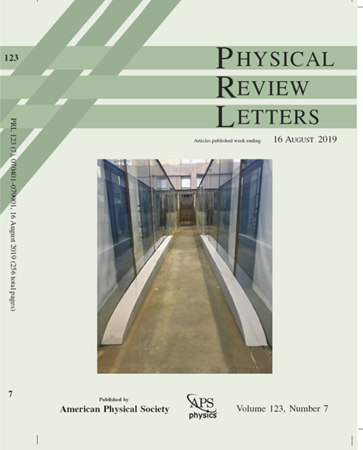Diffusive Hydrodynamics from Long-Range Correlations
IF 8.1
1区 物理与天体物理
Q1 PHYSICS, MULTIDISCIPLINARY
引用次数: 0
Abstract
In the hydrodynamic theory, the nonequilibrium dynamics of a many-body system is approximated, at large scales of space and time, by irreversible relaxation to local entropy maximization. This results in a convective equation corrected by viscous or diffusive terms in a gradient expansion, such as the Navier-Stokes equations. Diffusive terms are evaluated using the Kubo formula, and possibly arising from an emergent noise due to discarded microscopic degrees of freedom. In one dimension of space, diffusive scaling is often broken as noise leads to superdiffusion. But in linearly degenerate hydrodynamics, such as that of integrable models, diffusive behaviors are observed, and it has long been thought that the standard diffusive picture remains valid. In this Letter, we show that in such systems, the Navier-Stokes equation breaks down beyond linear response. We demonstrate that diffusive-order corrections do not take the form of a gradient expansion. Instead, they are completely determined by ballistic transport of initial-state fluctuations, and obtained from the nonlocal two-point correlations recently predicted by the ballistic macroscopic fluctuation theory; the resulting hydrodynamic equations are reversible. To do so, we establish a regularized fluctuation theory, putting on a firm basis the recent idea that ballistic transport of initial-state fluctuations determines fluctuations and correlations beyond the Euler scale. This extends the idea of “diffusion from convection” previously developed to explain the Kubo formula in integrable systems to generic nonequilibrium settings.远距离相关的扩散流体力学
在流体力学理论中,多体系统的非平衡动力学在大尺度空间和时间上被近似为局部熵最大化的不可逆松弛。这就产生了由梯度展开中的粘性或扩散项修正的对流方程,如纳维-斯托克斯方程。扩散项使用Kubo公式进行评估,并且可能由由于丢弃微观自由度而产生的新兴噪声引起。在一维空间中,由于噪声导致超扩散,扩散标度经常被打破。但在线性退化的流体力学中,如可积模型中,可以观察到扩散行为,并且长期以来人们一直认为标准扩散图仍然有效。在这封信中,我们证明了在这样的系统中,Navier-Stokes方程在线性响应之外被打破。我们证明了扩散阶修正不采用梯度展开的形式。相反,它们完全由初始态涨落的弹道输运决定,并由最近由弹道宏观涨落理论预测的非局部两点关联得到;所得的水动力方程是可逆的。为此,我们建立了一个正则化的涨落理论,在一个坚实的基础上建立了最近的想法,即初始状态涨落的弹道输运决定了欧拉尺度以外的涨落和相关性。这扩展了以前用于解释可积系统中的Kubo公式的“对流扩散”思想到一般非平衡设置。2025年由美国物理学会出版
本文章由计算机程序翻译,如有差异,请以英文原文为准。
求助全文
约1分钟内获得全文
求助全文
来源期刊

Physical review letters
物理-物理:综合
CiteScore
16.50
自引率
7.00%
发文量
2673
审稿时长
2.2 months
期刊介绍:
Physical review letters(PRL)covers the full range of applied, fundamental, and interdisciplinary physics research topics:
General physics, including statistical and quantum mechanics and quantum information
Gravitation, astrophysics, and cosmology
Elementary particles and fields
Nuclear physics
Atomic, molecular, and optical physics
Nonlinear dynamics, fluid dynamics, and classical optics
Plasma and beam physics
Condensed matter and materials physics
Polymers, soft matter, biological, climate and interdisciplinary physics, including networks
 求助内容:
求助内容: 应助结果提醒方式:
应助结果提醒方式:


